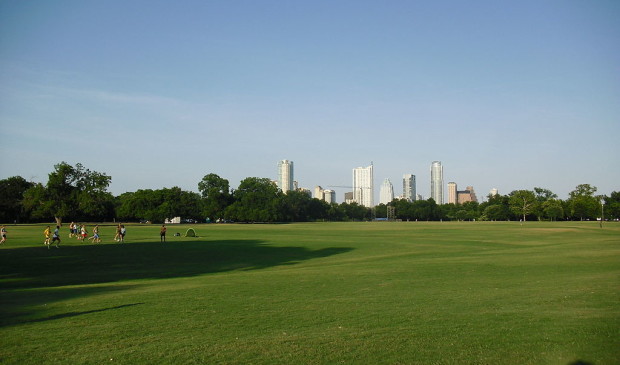Council puts off vote on parkland fees
Tuesday, September 22, 2015 by
Jo Clifton Last week, City Council postponed action on a staff proposal that would significantly increase parkland dedication fees for developers of most new residential developments, with fees dependent on density. Staff brought forth the proposal after more than a year of work as a result of a resolution adopted by Council in August 2014.
Although Council did not take up the matter until after 11 p.m. on Thursday, several representatives of development interests – and one neighborhood advocate – waited through the day to speak about the proposed change.
Currently, developers provide land or pay a fee-in-lieu of land at $650 per dwelling unit, which applies regardless of the intensity of the development. That fee has not changed since 2007.
The proposed fee for low-density development of up to six units per acre would be $1,030 plus a park development fee of $521, for a total of $1,551 per unit. The fee-in-lieu for a medium-density development of six to 12 units per acre would be $1,220, including the park development fee of $410. The high-density fee-in-lieu of land would be $626 plus a park development fee of $317, for a total of $943. Developments that are certified as affordable housing by the city are exempt from the ordinance.
According to a memo from Parks and Recreation Director Sara Hensley, Austin currently has lower fees than Houston; El Paso; Portland, Oregon, and several other cities. Hensley wrote, “The city of Austin park acreage per 1,000 residents has steadily declined due to the population growth from a high of 29 acres in 1994 to 20 acres in the last 20 years.” She noted that the city has a goal of acquiring parkland within one quarter-mile of all residents in the urban core and one half-mile within the suburban core.
Parks department staffer Randy Scott told Council that $650 per unit does not cover the cost of land acquisition or development. He said the city will have a 5,000-acre deficit of parkland by the year 2020.
Hensley proposed that the new fee schedule take effect in January. She hopes that the new fee schedule will join other fees that are reviewed each year when the budget is adopted so that it can keep up with costs.
Among those criticizing the new fees was Eric Goff of AURA. Goff told Council it should be very careful in adopting the new, complicated policy. “One, you can’t use this money to implement your park master plan,” Goff said. “You can’t use it for maintenance of existing parks. And as you know, it’s tough to fund parks. You just went through the budget session. And so we have some existing parks that need funding. So I encourage you (to) have a policy discussion.”
Goff also suggested another option: “To allow higher-value development near parks that can keep the same tax base – higher tax base, same tax rate, and you get more money for parks.”
Goff told the Austin Monitor, “Right now, they’re proposing charging a fee on a per-person basis, so the more people you put on one piece of property, the higher the fee will go.” Developers can choose to provide land on-site for a park, but Goff said the formula “is so broken” that the city can ask for more land to be provided for parks than the total proposed for development. He suggested a fee per acre of development instead of per household.
Neighborhood advocate David King spoke in favor of the revised fee, noting that it has been eight years since the fee was updated. He said, “With the growth that we’ve had, particularly in central Austin, there’s not enough parkland to go around, and the parks we do have are becoming very crowded and overused.”
Heidi Gerbracht, speaking for the Real Estate Council of Austin, told Council, “The development community’s legitimate concerns really remain unaddressed. … We’re ready to provide expertise and hammer out a reasonable solution that gets what we need without the negative impact to affordability. This is not a postponement request that’s meant to derail the possibility of a new ordinance and a fee increase. It’s a genuine request for a decision-maker to collaborate with the community who will be impacted on a proposal that we can all support.”
Later Gerbracht told the Monitor, “Austin has 17,000 acres of park – the most of the list (provided by Hensley) next to Houston, which has 20,000 acres. Austin has 40 percent of the population of Houston for 85 percent of Houston’s park space.” She criticized the proposed ordinance because it gives the parks department “the unfettered discretion to allow a parkland fee” instead of dedication of land in addition to increasing the requirements for land.
Mayor Pro Tem Kathie Tovo said the item has been “in progress for years, and I’m, for one, really anxious to see us move forward and increase the fees.” She said there have been plenty of meetings with stakeholders, and she was satisfied that they had been able to provide input.
Consideration of the ordinance was postponed to Oct. 15. The public hearing remains open.
Photo by Airainix (Own work) [CC BY-SA 3.0], via Wikimedia Commons.
You're a community leader
And we’re honored you look to us for serious, in-depth news. You know a strong community needs local and dedicated watchdog reporting. We’re here for you and that won’t change. Now will you take the powerful next step and support our nonprofit news organization?










